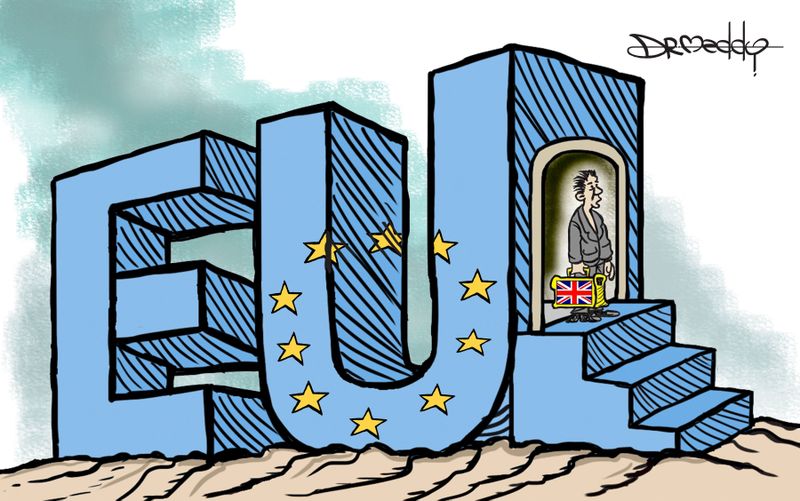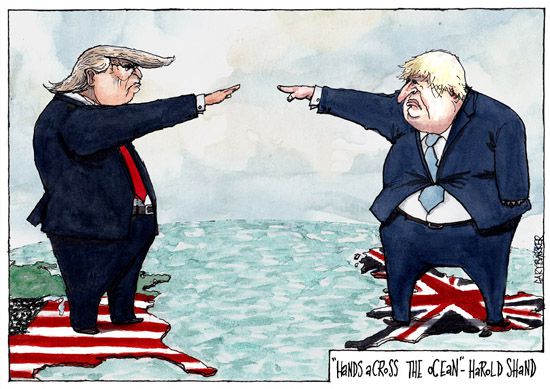Brexit: How a minority took control
Boris Johnson: “Now this is a real pigs breakfast, I think I’ll let someone
else clean it up.”
Was it a Mistake?
In my opinion, if the vote was held today, 70% or more would vote to stay and the turnout would be 90% or higher. People are now engaged in the real issues in a way they weren’t in the lead up to the vote. In the lead-up much of the conversation was all about hate, immigrants, fear-mongering and the stuff that gave the Britain First FB page an audience if millions. Residents of the UK are just now facing up to the fact an exit can seriously affect their well-being as well as the very standing of their country in world affairs. Canada would have faced the same challenges if a few votes in our country had gone one-half of one percent the other way back in the mid-1990’s.
Below is the current lead photo on the Britain First FB Page. A sign-up page is provided.
During the lead-up to the referendum the Britain First FB page was filled with hateful racist comments and general misinformation that was followed by millions including many in Canada.
It is perplexing to me that given the high stakes involved in breaking up a country through a referendum, a simple majority is all that it takes. In England, the ‘exit’ side only needed to attract 36% of the voters in order to secure the win. The remaining 64% (and now probably a good portion of the 36% who voted to exit) are wondering just what in hell happened. Why these numbers?
With a voter turnout of just over 70%, and a 48-52% split, that translates to roughly 34% voting to stay and 36% voting to leave. Of the those who didn’t cast a ballot (28%), it is now known to contain a large number of young people who generally supported the ‘stay’ side. Why they didn’t vote is not certain, but it seems social media played a role. Indications suggest general comments on Twitter, Facebook, etc., indicated the ‘stay’ side would win by a wide margin. With a ‘win’ on the horizon, a lot of young people didn’t bother to cast a ballot. This whole exercise demonstrates the danger of a simple majority (50% plus 1) when combined with poor information about outcomes. Why is it important to raise the bar when the stakes are high?
A Healthy Constitution and Bylaws
For a good part of my retired life, I sat on the Boards of Directors of non-profit organizations at the local, provincial and national level and while there was often tasked with dealing with Constitutional matters. Developing a solid, sustainable organization that cannot be easily whipsawed by special interest groups is no easy task and when countries are involved it is no different.
In drafting a Constitution it is generally accepted that a supermajority (usually 66 2/3% or higher) is needed to bring about a major change in the organizations structure (e.g. mergers, voting structures, changing the Constitution, etc.). Bylaws on the other hand usually deal with day-to-day operations and only require a simple majority (50% + 1) unless otherwise stipulated.
The higher vote requirement for Constitutional change is needed to insure a majority clearly understand what was being proposed and that a solid majority of those members support the change. That is why Constitutional change is often difficult to achieve.
Even with the high vote turnout in England (72%), it only took 36% to carry the day. It is almost certain that a large number who voted for leave did so without having any idea of what the future might bring. For an entire country, deciding to ‘leave’ based on the wishes of 36% of the population is ludicrous. Britain is now facing an existential crisis of monumental proportions, as the divisions created within the country will take decades to heal. It now seems possible the country will continue to break-up if Scotland decides remain with the EU (which it voted to do in the referendum).
Even the driving force of ‘leave’ campaign, Boris Johnson, the Lord Mayor of London, has baled as he had no plan what-so-ever to carry the country forward if the leave side won. His city largely voted to remain, so he will likely soon be vacating that position as he now admits he never expected the referendum to pass. What a pigs breakfast he helped create just a Donald Trump is now doing in the United States.
Two men, Donald Trump and Boris Johnson are driven by egos the size of the Atlantic Ocean and both use a similar manner to incite people to follow them.
The Canadian Experience
Canada has faced similar situations with the Quebec referendums. In 1980 the Quebec separatist vote was 60% for remain and 40% for leave with an 85% voter turnout. In 1995 after years of acrimonious debate within Quebec and across Canada, the vote was 49.5% voting to leave and 50.5% to remain. Voter turnout was 95%. In our 150 years history, that was the closest Canada ever came to breaking up and it was caused largely because a simple majority was allowed to stand.
In Canada, amendments to the Canadian Constitution:
“can be passed only if identical resolutions are adopted by the House of Commons, the Senate and two thirds or more of the provincial legislative assemblies representing at least 50 percent of the national population. This formula, which is outlined in section 38 of the Constitution Act, 1982, is officially referred to as the “general amendment procedure” and is known colloquially as the “7+50 formula”.
If in the future one of the Canadian Provinces desire too separate, I think it only reasonable to expect a supermajority be required. Canada has held together for 150 years and we are considered one of the most successful multicultural democracies in the world. This has been accomplished because when push comes to shove a supermajority in our country prefers to build bridges rather than walls.
Perhaps over the next several months the people of Great Britain will come to terms with the decision that was made by the minority. They may even take another vote just to see if the first was real. Quebec tried twice and lost both times (the second by the skin of our teeth), but it seems Quebec has come to terms with their position in Canada even though the media continues to try and stir up resentment.
In closing, you may get a kick out of the video presented in the TV series, “Yes Minister”. It speaks to the issues at hand in Britain.
Harold
Just in on July 4, 2016: Nigel Farage resigns from the Nkip leader, and acknowledged leader of Brexit over the past two years. He laughed as he walked out the door. What an absolute scoundrel.
(452)
Trackback from your site.



